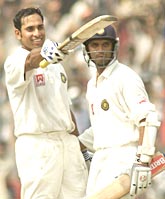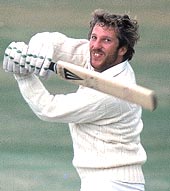Home > Cricket > Report
When cricket teams dared to dream
Maxwell Harrington in London |
May 14, 2003 20:28 IST
Test cricket's long history has been punctuated by one or two remarkable feats of endeavour when teams have pulled off extraordinary victories from desperate positions.
The West Indies certainly sounded confident of hitting up the 418 runs required to beat Australia at St John's the other day, but surely it was no more than bold ambition.
No team had ever achieved such a daunting target. Yet, against all probability, this young Caribbean side got there.
Australia were seemingly striding towards their first ever whitewash of Tests in the West Indies. And the home team was fielding an inexperienced lineup that had failed to reach 400 in any of its seven previous innings during the series.
While applauding the efforts of Messrs Sarwan, Chanderpaul, Lara and Banks, we can also remind readers of some other dashing exploits in recent years from international batsmen who refused to throw in the towel.
Of course, every Indian cricket fan would like to say he was there when V V S Laxman and Rahul Dravid turned a match of one-way Australian traffic firmly on its head.
 Eden Gardens, Calcutta, will forever be associated with the stunning match in the 2000-01 season when India followed on and ultimately beat Australia as Harbhajan Singh tormented the Aussie batsmen on the final day.
Eden Gardens, Calcutta, will forever be associated with the stunning match in the 2000-01 season when India followed on and ultimately beat Australia as Harbhajan Singh tormented the Aussie batsmen on the final day.
Australia had racked up 445 in the first innings and bowled their hosts out for 171. But skipper Steve Waugh admitted later that he erred in enforcing the follow-on in searing conditions. Laxman's fifth-wicket partnership with Dravid, who made 180, was worth 376. In making 281, Laxman moved past Sunil Gavaskar's previous Indian record of 236 and notched up the highest Test score on Indian soil, surpassing West Indian Rohan Kanhai's 256 in 1958.
Apart from anything else, India's victory was worth so much it turned a seemingly certain 2-0 series loss into a 1-1 tie with a decider to come.
By the time the players reached Madras, the momentum was with the home side and the series victory promptly followed. The Calcutta win also ended Australia's remarkable streak of 16 victories, which had started the previous season way south in the Tasmanian capital Hobart.
Pakistan were the opponents when the Aussies took a slight first-innings lead, only to see their advantage disappear when Inzamam-ul-Haq cracked a century for the tourists.
A target of 369 -- requiring the highest fourth-innings score on Australian soil -- was made all the more difficult when Azhar Mahmood dismissed Greg Blewett and Mark Waugh off successive balls to leave the hosts 81-3.
But the revival came thanks to contrasting innings from Justin Langer, who took seven hours over his 127, and Adam Gilchrist, who smashed 149 from 163 balls. Gilchrist's performance in only his second Test went a long way in silencing those who had criticised his selection ahead of Ian Healy for the series.
Headingley in Leeds has been the scene of many peculiar Test matches, but none has surpassed England's performance in July 1981 -- a match which thrust all-rounder Ian Botham into the pantheon of the game's legends.
What is often forgotten is that England were still 92 runs away from making Australia bat again when a Test match novice, and out-and-out tailender, Graham Dilley, came out to bat.
"Let's have some fun," the all-rounder is supposed to have announced, launching a 117-run partnership. Botham hit an unbeaten 149 from 148 balls, leaving the Aussies requiring 130 to win. And although Bob Willis then produced a career-best 8-43 to bowl Australia out 10 runs short, the match has entered the annals as Botham's Test.
Of course, the West Indies will be doubly pleased to have broken the record fourth innings total for victory in Antigua on Tuesday because the previous mark was set against their predecessors at home.
It was the third Test in 1975-76 and the venue was the Queen's Park Oval, Port-of-Spain, Trinidad. Viv Richards took early control of the match with a first innings 177 after skipper Clive Lloyd won the toss. Michael Holding proved that it was not simply a batsman's wicket with 6-65 as the tourists were bowled out for 228, 131 runs behind.
Alvin Kallicharan extended the advantage with a second innings century, allowing Lloyd to declare on 271-6, setting India an apparently impossible total.
They needed 403 to win, but India's batsmen proved up to the task, Sunil Gavaskar crafting a patient 102, Mohinder Amarnath an even more patient 85, Gundappa Viswanath hitting 112, and Brijesh Patel an unbeaten 49 to lead the tourists to victory.

|
What do you think about the story?

|

|

|

|
Read what others have to say:
|

|

|
Number of User Comments: 3
|

|

|

|

Sub: Something stinks with this report
I do not know who Maxwell Harrington in London works for, But if he doesn’t work for BBC Sports (Or the original source), and he ...

Posted by TJ

|

|

|

|

Sub: Ethical reporting
I agree with TJ. Whatever happenned to ethical reporting. Even if the writer on the bbc was same, why duplicate articles? Are we running out ...

Posted by SJ

|

|

|

|

Sub: When cricket teams dared to dream
A vey well written articles - on tales worth being told over and over again. These exploits make test match cricket what it really is. ...

Posted by R. N. Bose

|

|

|
|

Disclaimer
